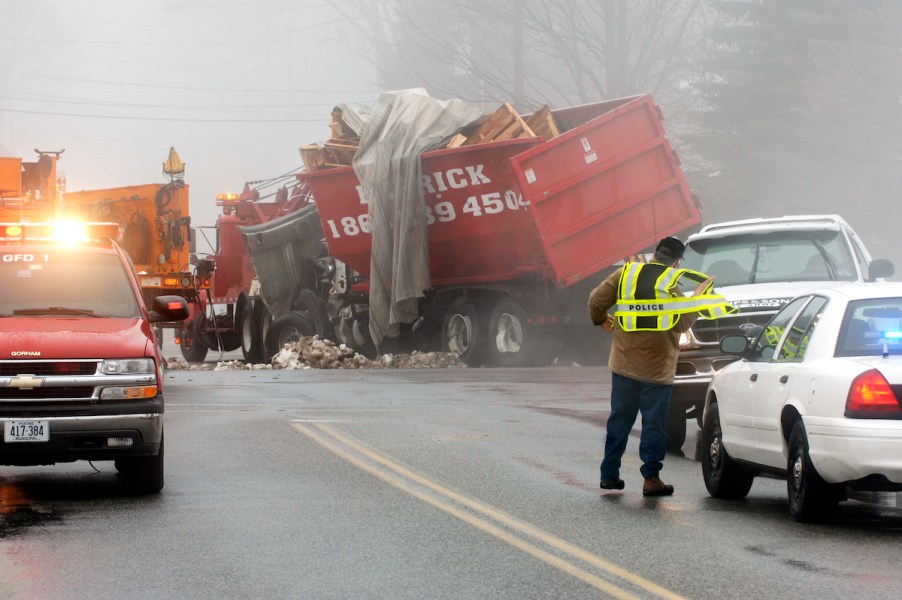
Garbage Trucks Are Dangerous and Get in a Surprising Number of Accidents
Car accidents result in severe injuries or even death. Garbage truck crashes can be particularly dangerous, considering their sheer size and weight. Government-run and privately owned garbage, trash, and recycling services must adhere to safety standards to minimize the number of accidents that their trucks cause. However, garbage truck accidents still happen more often than you think.
Garbage truck accidents jeopardize public safety
Here are a few examples of accidents involving garbage trucks.
In September 2020, WHAM reported an incident where the arm of a garbage truck in Rochester, New York, inadvertently grabbed a bench on which a woman was sitting, launching her onto the sidewalk. Although she wasn’t seriously injured, the incident left her with deep cuts. The above Twitter post shows footage of the accident.
And in Manteca, California, a man was rushed to the hospital in critical condition after being struck by a garbage truck on April 25, 2022, KCRA reported. According to the police, the accident took place around 4.51 a.m. The cause of the accident remains unknown, but authorities are working with the truck’s driver and witnesses to gather facts about the crash.
Although garbage truck accidents involving the public are scary, most injuries happen to their operators. For instance, this past April, two workers were forced to jump off a moving garbage truck as it careened downhill toward Goffle Brook Park in Passaic County, New Jersey. The accident, which occurred around 11.30 a.m., involved a Gaeta refuse truck that had lost its brakes, Daily Voice reported. The vehicle sped down Brockhuizen Lane before hitting bushes on a retaining wall. The driver and passengers were hospitalized with serious injuries.
Garbage truck accidents are concerning

According to Trucking Watch, 2017 saw 107 fatal refuse-truck accidents and over 1,400 related injuries. On the other hand, OSHA recorded 25 fatal garbage-truck collisions in 2017. Twenty-five percent of people killed in these crashes are the vehicles’ operators. These incidents occur because the trucks operate in the morning while it’s still dark. They also tend to start and stop frequently.
Some crashes happen because the operators must stop the vehicles in the middle of the road. For instance, two girls — a teenager and an infant — died after the car their mother was driving crashed into a stationary recycling truck in the middle of a rural road in Washington state. After suing the private garbage company, the mother recovered $2.7 million, but the monetary award can’t bring back her two daughters.
A journalist investigated the safety of a private waste collection company in New York in 2018. Hidden cameras installed in the trucks’ cabins revealed drivers falling asleep at the wheel. Some drivers worked 10 to 14 hours a day, six days a week. The probe concluded that municipal management trucks are safer than private garbage collection companies.
What can authorities do to reduce these incidents?
Recycling Today reported that 17 garbage truck fatalities occurred in the first 22 days of 2019. Responding to the matter, the Solid Waste Association of North America (SWANA) called for municipalities and private waste management companies to review their work-safety protocols to mitigate what the association called an “unprecedented uptick in garbage truck fatalities” that year.
The 17 fatalities may be preliminary statistics, but they were enough to raise the alarm. SWANA said these incidents should remind companies, city officials, and the public to push for a renewed commitment to safety. Meanwhile, SWANA remains focused on expanding its safety programs with one objective: to raise awareness and ensure zero fatalities in the waste management industry.


